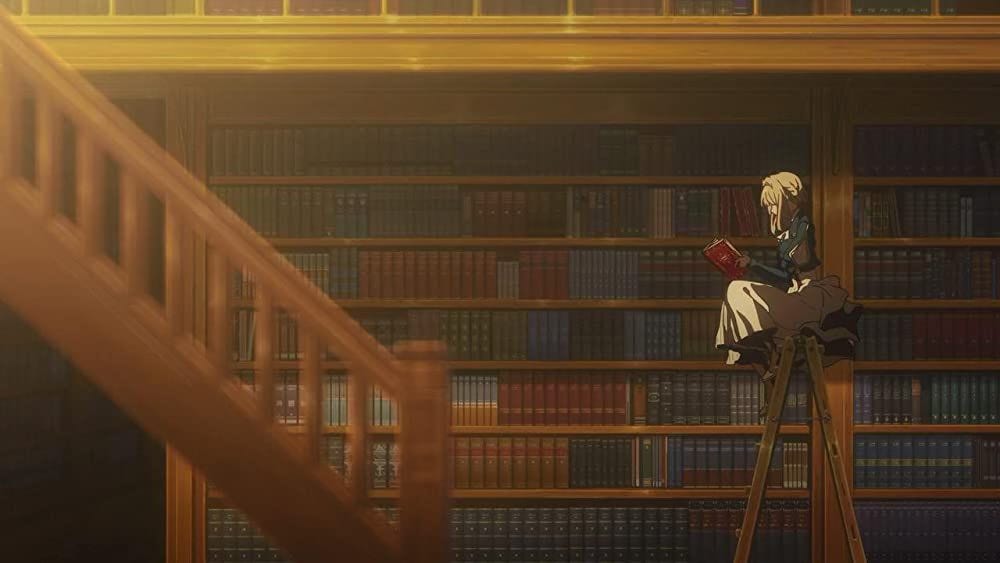when the story lives in your body
Violet Evergarden, the ghost, and the machine (part 1 of metal and fire)
“In actuality, I’ve written a thousand novels. Only I haven’t written them. I’ve lived them.”
~

Once upon a time there was a girl who liked stories so much she put them everywhere: she filled up notebooks, and left them in piles in every room in her house; she even slept with them between the folds of her sheets and woke with them at her feet like lovers who stayed.
But there was one place she wasn’t sure the stories lived: in the place of her body. In the three-dimensional space where she lived and moved and had her being, there were limits; there were rules. She could explore on the flat planes of the pages; she could explore the halls of her mind.
But they could not let her Self be the player, even though her life was a muse:
When she decided, finally, that stories could live in her body, many parts of her rebelled. Many parts of her were afraid—a page is a stage and a stage is a space—and the right space has always been as alive to her as a friend.
But it hurt to be here.
It always had.
And when she went inside her body and found the places that hurt, and sat with them like the taut strings of an instrument, recoil as a reflex, then the slow ease of only an attuned gaze or touch can release—even when the pain that had coiled the cathedral of her body like the contraction of a mammal whose labor is stalled by the pursuit of a predator let up its tyrannical fist—the imprint, the haunting of the contraction followed her like a ghost: —what if what if what if—
She had to sit with that too—phantom pain of phantom limb.
Except instead of dismembering it was remembering—and she had to be
patient.
She wasn’t the only one who was patient.
She let the stories collect like rainfall and trusted the deep work of resonance even when she could hold it in her fist. (When are we supposed to hold anything in our fists?)
She let the story start to live in her body. She directed it, sometimes, like a ship’s wheel. Other times, let the wind find her course. She was not the only body the story lived within—she was a player, a fractal of a larger body and this one she’d always believed in. It’s weather or not she belonged to it that she’d questioned.
At first, it was the pain had showed her where to look.
~~~
I wrote this before I ever watched Violet Evergarden, apparently a classic anime series that I decided to give a chance as a foray into a new genre of storytelling. I chose to watch it this winter because the cinematography is stunning and saturated and fiery and it moves very. VERY slowly — it was like sitting in a long sunset.
I found the above piece to have startling similarities to the protagonist — like Violet, my heart wears certain kinds of armor and needs certain kinds of fire. My heart is connected to my hands. A part of myself that is currently burning and needs to move slow and saturated, too. We discussed this in one of my last essays.
The story starts a little flat, but I have to admit that by the end the texture of the characters builds to the point that I’d call it deep quality storytelling.
The story centers around an orphan girl in a WWII-adjacent fantasy world who gets conscripted into the military as a teenage killing machine, falls in love with her commanding officer, gets her arms blown off, and postwar becomes a ghostwriter, writing letters for other people with her mechanical hands, as a way to try to find and feel her own broken heart.
At first the plot was a bit subtly but nauseatingly catered to a certain manic-pixie-dream-girl-loving audience…but I did find myself resonating with her on several symbolic levels, and the symbolism grew in complexity over the build of the story.
The 13-episode series centers around Violet finding her agency, and her heart.
Like her, parts of me are ghost.
Like her, parts of me are machine.
A ghost is a spirit without a body and a machine is a body without a spirit. The trick is that they must find each other.
As a conscripted soldier, Violet is bound to the orders of her superiors, and doesn’t understand what it means to feel. As a ghostwriter, she “will travel anywhere to fulfill your request,” who channels words of love through her metal hands, her freedom is found slant — she follows the final orders of her commanding officer, who with his dying breath tells her to find her own life.
She finds her agency by following orders. It’s a trick — the kind of trick we all need sometimes.
Love can work that way, sometimes.
“The major ordered me to-
to live.”
“then live.”
“Am I allowed to?”
~Violet Evergarden
I’ll be writing more about her, and several other stories that have been seeping through my psyche, in upcoming essays.
PS I’ve also started another new section: alidade, where I’ll be putting past writings. I hope you enjoy it.
*the fairytale was inspired by a post by Sky Fusco a year or so ago on Instagram.







Thank you so much for the mention in this well written article. I’m truly touched.